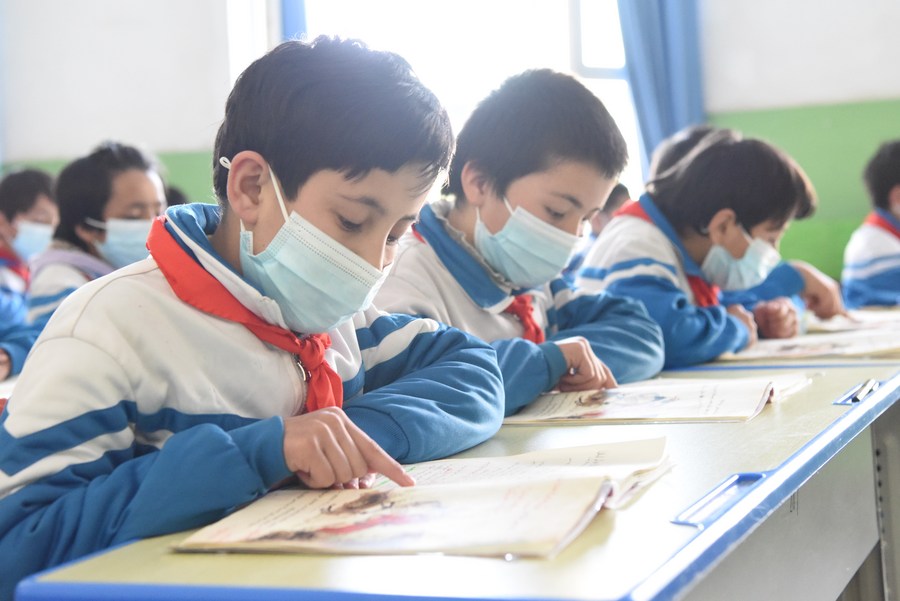Xinjiang residents share personal stories to debunk lies on human rights condition

Students read textbooks at a primary school in Awat Township of Kashgar, northwest China's Xinjiang Uygur Autonomous Region, March 31, 2021. (Xinhua/Ding Lei)
URUMQI, Oct. 1 (Xinhua) -- All ethnic groups in northwest China's Xinjiang Uygur Autonomous Region have equal access to education, freedom of religious belief and other basic rights, local residents told a press conference on Thursday.
Addressing the briefing held in the Hui Autonomous Prefecture of Changji, locals shared their personal stories to refute the fallacies concerning the region's human rights condition concocted by Western anti-China forces.
Rural schools in Xinjiang, with continuous improvements to the environment and quality of teaching, have helped change the destiny of many students, said Sanam Ibrayim, a rural school teacher from Changji.
Expounding the developments, Ibrayim said one of his former students, Zulfiya Wali, who grew up in a poor Uygur family, was admitted to a major university in Beijing two years ago.
Every time Wali returns home for vacation, she would encourage local children to study more at school and even help them with their studies, Ibrayim added.
In recent years, Xinjiang has continuously increased its investment in education and implemented a series of policies to subsidize or exempt tuition fees for students.
Alim Rahmudul, an Imam from Changji, said that conditions of Xinjiang's mosques have seen great improvements such as expanded indoor space, air-conditioning and hot water supply all throughout the year.
"The mosques are thronged by religious practitioners during major Islamic festivals," he said, adding that people are free to choose their religious faith or no faith in Xinjiang.
Xinjiang attaches great importance to the preservation and development of the fine traditional culture of all ethnic groups and has promoted the protection and inheritance of intangible cultural heritages.
Abduwali Haliq, a musician living in Changji, is a good player of Tambur, a classic string instrument from Xinjiang. He enjoys exchanging skills with other musicians and always teaches local children to play the instrument.
"Those who fabricated the 'cultural genocide' nonsense should not lie through their teeth," said Haliq.
Photos
Related Stories
- Xinjiang company under U.S. sanctions refutes "forced labor" fallacies
- World's first desert-railway loop line in Northwest China
- Bread made in Xinjiang to land on Russian plates
- Xinjiang residents reject "forced labor" slander
- Xinjiang's Alataw Pass port handles 5,000th China-Europe freight trains in 2021
Copyright © 2021 People's Daily Online. All Rights Reserved.










